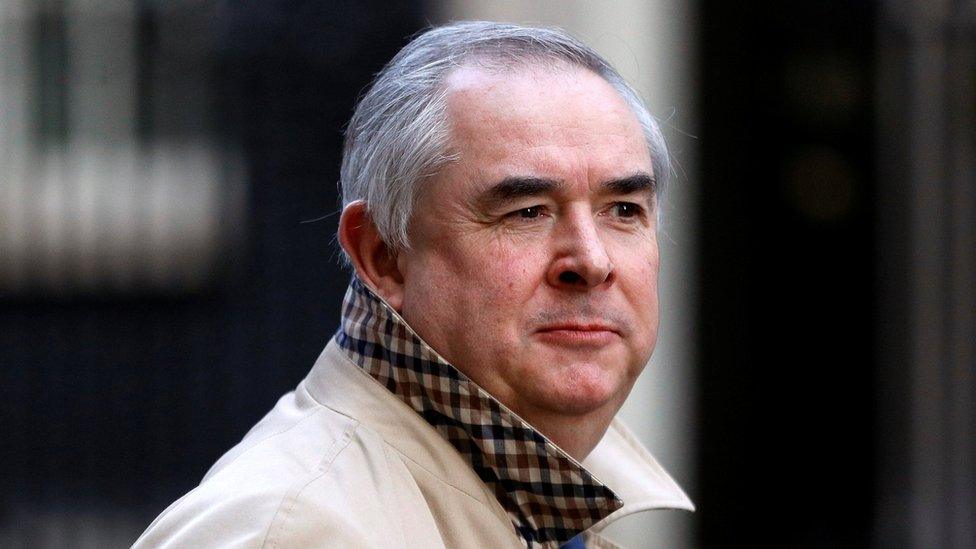Brexit: Cox has Theresa May's fate in his hands
- Published

The man who is arguably the most powerful force in the land at the moment was a stranger to many in Westminster until last summer.
Geoffrey Cox, a more familiar face at the Bar until his appointment as attorney general in July, now holds the fate of Theresa May's premiership in his hands.
The prime minister has placed Cox in charge of negotiating changes to the Northern Ireland backstop in the EU withdrawal agreement.
If the attorney general succeeds, he can expect the prime minister to be eternally grateful. He would have pulled off the seemingly impossible after her Brexit deal was comprehensively rejected by MPs in January.
Conservative MPs are bracing themselves for a flamboyant Gilbert and Sullivan performance by Cox at Westminster if he lands a deal with the EU.
With his distinctive rich baritone voice, Cox is being lampooned by some Brexiteers as a modern Pooh-Bah, the character in the comic opera Mikado who amasses numerous titles and is known as the Lord-High-Everything-Else.
'Mark his own homework'
The Brexiteers say that, like Pooh-Bah, Cox has amassed jobs that are bound to run into conflict with each other. He is now the government's chief negotiator with the EU on legal changes to the Northern Ireland backstop while serving as the government's chief law officer.
The multiplicity of roles means that Cox will conduct the negotiations and then pass legal judgment on them.
One Brexiteer tells me: "People think the attorney general is this great independent force. But the government is his client and he is negotiating the deal on its behalf. But he will then mark his own homework. He will become his own client."
One former Conservative cabinet minister draws parallels with Lord Goldsmith, Tony Blair's attorney general at the time of the Iraq war, who famously changed his legal advice shortly after visiting Washington.
The former minister told me: "There you see Geoffrey Cox rushing off to Brussels and Dublin. So it will be hey presto and he will change his original legal advice that had said the backstop could be permanent."
Another former Conservative cabinet minister, who supports Leave, has been given a personal assurance by the attorney general that he will not allow a repeat of the Iraq legal advice.
The former minister tells me: "Geoffrey Cox knows he cannot do what Peter Goldsmith did. He has told us that he will not change his legal advice unless he negotiates changes, legally binding assurances."
There are signs that Brexiteer Tories and the DUP may be able to accept the key change Cox is seeking: a legally binding time limit to the Northern Ireland backstop.
The backstop is designed to avoid a hard border by tying Northern Ireland closely to the rules of the EU if the UK and Brussels fail to negotiate a future relationship by the end of a planned transition period.
Jacob Rees-Mogg, the head of the European Research Group, told the FT this week that he could accept a legal codicil attached to the withdrawal agreement stating that the backstop could not last permanently.
On Thursday, the DUP's Brexit spokesman Sammy Wilson told the BBC that his party could accept a time limit to the backstop as long as it was short.
A DUP source told me the party is being flexible: a simple change of two digits in the withdrawal agreement would be enough to win over his party.
"All you need to do is change 20XX to a specific date and you have a deal," the source told me.
This is a reference to the section of an early draft of the withdrawal agreement which said that the transition period, due to end in December 2020, could be extended until "31 December 20XX".
The DUP are quite attracted by the idea of using the transition period, in which the whole of the UK would effectively remain as a non-voting member of the EU, as a way of sidestepping the backstop.
The DUP demand would involve making changes to an early version of the withdrawal agreement which was subsequently tweaked by EU leaders at a summit on 25 November. The final version reiterated the December 2020 end date for the transition, but added that it could be extended "for up to one or two years".
The EU is insistent that it will not amend the text of the withdrawal agreement. But it has indicated that it would be willing to provide legal assurances as long as they do not contradict the agreement.
That lies at the heart of the complex set of negotiations being conducted by an attorney general, who has embarked on what he regards as a deadly serious mission.
Back home, friend and foe await the reappearance of the showman of Westminster.
You can watch Newsnight on BBC 2 weekdays 22:30 or on iPlayer. Subscribe to the programme on YouTube, external or follow them on Twitter, external.
- Published16 October 2019

- Published21 February 2019
